|
|
|
Sort Order |
|
|
|
Items / Page
|
|
|
|
|
|
|
| Srl | Item |
| 1 |
ID:
117464
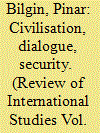

|
|
|
|
|
| Publication |
2012.
|
| Summary/Abstract |
The purposes of this article are twofold: (1) to consider the extent to which Dialogue of Civilisations (DoC) initiatives, as alternative visions of post-secular world order, are likely to address insecurities that they identify; and (2) to point to other insecurities that are likely to remain unidentified and unaddressed in the process. In their present conception, DoC initiatives risk falling short of addressing the very insecurities they prioritise (the stability of inter-state order) let alone attending to those experienced by non-state referents, which they overlook. The article advances three points in three steps. First, I point to how projects of civilisational dialogue have bracketed civilisation, thereby leaving intact the Huntingtonian notion of civilisations as religiously unified autochthonous entities. Second, I argue that while contributing to opening up space for communication, DoC initiatives have nevertheless failed to employ a dialogical approach to dialogue between civilisations. Third, I tease out the notion of security underpinning DoC initiatives and argue that the proponents DoC, in their haste to avert a clash, have defined security narrowly as the absence of war between states belonging to different civilisations. Theirs is also a shallow notion of security insofar as it fails to capture the derivative character of security and insecurity.
|
|
|
|
|
|
|
|
|
|
|
|
|
|
|
|
| 2 |
ID:
117456
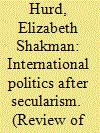

|
|
|
|
|
| Publication |
2012.
|
| Summary/Abstract |
At the height of the influence of the secularisation thesis religion was understood to be absent from affairs of state and the law, including international politics and international law. As the critique of secularisation gained momentum this master narrative fell apart, and a new consensus began to take shape. The notion that religion had been ignored and should be 'brought back in' to International Relations took centre stage among many academics and practitioners. The assumption is that restoring religion in the right way will help address the problems associated with having ignored religion in IR, paving the way for the marginalisation of violent religion and globalisation of religious freedom. This article undertakes a critical analysis of this restorative narrative and the religious and political world it is creating. It then proposes a different approach to the intersection of religion and world politics after secularism. This approach draws attention to the authority of transnational actors such as the United States, United Nations, and European Union to shape the public administration of religious affairs globally. Channels through which this is accomplished include the promotion of religious freedom, humanitarian intervention, foreign aid, nation building and democratisation, counterterrorism and peace-building efforts, and the pronouncements of supra-national courts.
|
|
|
|
|
|
|
|
|
|
|
|
|
|
|
|
| 3 |
ID:
117461
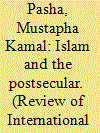

|
|
|
|
|
| Publication |
2012.
|
| Summary/Abstract |
The language of the 'postsecular' acknowledges the enduring presence of faith in politics, repudiating secularisation theses claiming diminution or privatisation of religion in social and political life. In cognitive and experiential worlds, those presumably unfettered by these conceptions (for example, the Islamic Cultural Zones or ICZs), the postsecular presents a different order of challenge and possibility. The term ICZs refers to Muslim majority areas informed by transnational subjectivities loosely connecting varied Islamic societies around symbolic commonality, memory, and historical experience. The term stresses the plurality of Islamic cultural experience, albeit distinguished by recognisable semiotic markers, without essentialising Islamic identity. This article questions the hegemonic view pervasive in both secular and postsecular theorising of the fiction of immutability of faith in the ICZs and recognises its rupture and displacement under conditions of late modernity. The ontological dislocation in the character of religion itself under conditions of late modernity opens up the possibility to account for the assumed resistance of Islam to secular modernity, but also to explain Islam's imbrications in politics read under the sign of Political Islam. Paradoxically, under the condition of late modernity, a more homogenised Islam appears to crystallise in the ICZs at odds with an 'open' Islam.
|
|
|
|
|
|
|
|
|
|
|
|
|
|
|
|
| 4 |
ID:
117455
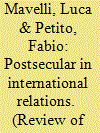

|
|
|
| 5 |
ID:
117462
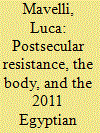

|
|
|
|
|
| Publication |
2012.
|
| Summary/Abstract |
At the heart of the notion of the postsecular is an implied and largely under-theorised idea of resistance against the pathologies of modern secular formations. This is most notably exemplified by Jürgen Habermas's highly influential approach which argues that these pathologies can be resisted through a cooperative cognitive effort of secular and religious consciousnesses. This article contends that this understanding overlooks more embodied forms of resistance to the effect that it curtails our capacity to conceptualise postsecular resistance in international relations. Following a contextualisation of Habermas's approach in the broader Kantian tradition to which it belongs, the article develops a contending Foucauldian reading of the body as a locus of resistance and uses this framework to analyse some of the events leading to the 2011 Egyptian revolution. The focus is on the publication of images and videos of police abuses by Egyptian bloggers and independent media as a practice of resistance to the widespread and systematic use of torture. The emotional response to these images, it will be argued, contributed to unite Egyptians despite longstanding fractures, most notably that between secularists and Islamists, thus turning the body from an 'inscribed surface of events' into a postsecular locus of resistance. The article concludes by highlighting the main implications of this analysis for future research agendas on the postsecular in international relations.
|
|
|
|
|
|
|
|
|
|
|
|
|
|
|
|
| 6 |
ID:
117463


|
|
|
|
|
| Publication |
2012.
|
| Summary/Abstract |
This article claims that the revolutions in the Arab world foster insight into more than the spread of liberalism. Fukuyama's end of history has not just reached the Muslim world faster than expected. These revolutions show that strong religion and liberal democracy are compatible: they are postsecular revolutions. As already the revolutions of 1989 proved in some respect, in contrast to the secular ideals of the French Revolution, revolution and religion can go hand in hand in a postsecular way. Praying and making revolution does not need to end in a religious autocracy as 1979 in Iran. Religious citizens stood up praying for democracy and the rule of law against secular regimes which legitimised themselves as a bulwark against sinister forces of religion. Analysing the revolutions of 1989, Jürgen Habermas speaks of 'catching-up revolutions' which brought nothing new to the course of history. Yet after 9/11 he started to develop his idea of a postsecular society in which secular and religious citizens are equally entitled to make their arguments in a public sphere. Criticising the early Habermas with the later, the article argues that the postsecular revolutions of 1989 and 2011 are preparing the ground for a postsecular democracy.
|
|
|
|
|
|
|
|
|
|
|
|
|
|
|
|
| 7 |
ID:
117460


|
|
|
|
|
| Publication |
2012.
|
| Summary/Abstract |
The last twenty years have seen the emergence of an intriguing postsecular discourse which seeks to remedy the limitations of the secular interpretation of politics. The resurgence of religion in the public sphere, the vociferous articulation of fundamentalist worldviews, and the intensification of conflict within and between religious traditions as well as between religious and secularist dispositions are evidence enough of the need to rethink standard secularist formulations. However, this article argues that postsecularity as a concept raises as many questions as it answers. While it rightly draws our attention to the profound discontinuities of our age, post-secularist thought is too preoccupied with certain specificities of contemporary Western discourse and practice to be able to make sense of the wider challenge-response dynamic that is integral to the current period of transition. This article examines the lacunae of post-secularity and avenues for further development of its insights by reference to four closely interlinked features of a rapidly transforming world order: (a) the transnational character of much religious discourse and practice; (b) the decline of the West and the corresponding shift in the economic and geopolitical centre of gravity; (c) the complex relationship between the resurgence of religion and the wider phenomenon of identity politics; and (d) the emerging dialectic between conflictual and dialogical approaches to cultural and geopolitical pluralism.
|
|
|
|
|
|
|
|
|
|
|
|
|
|
|
|
| 8 |
ID:
117457


|
|
|
|
|
| Publication |
2012.
|
| Summary/Abstract |
The past two decades have produced a bulky literature on religion and politics, with many writers being influenced by Habermas's notion of 'post-secularity'. However, despite the vast amount of literature, there is still little agreement on the meaning of this term. The article explores two main directions in which the expression has been interpreted: one direction where religious faith is in a way 'secularised' by being adapted to modern secular discourse; and another where faith triumphs over secularity by expunging its modern corollaries. What surfaces behind this divergence is a version of the immanence/transcendence conundrum which accentuates a presumed contrast of language games in which one linguistic idiom is said to be more readily accessible than the other. In agreement with Charles Taylor, this article challenges the assumption of an 'epistemic break' between secular reason and 'non-rational' religious discourse. Once this challenge is taken seriously, a new and more radical redefinition of 'post-secularity' comes into view: a definition where the prefix 'post' signifies neither a secular nor a religious triumphalism, but rather an ethical-political task: the task of liberating public life from its attachment to 'worldly' self- interest and the unmitigated pursuit of wealth, power, and military adventures.
|
|
|
|
|
|
|
|
|
|
|
|
|
|
|
|
| 9 |
ID:
117458
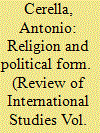

|
|
|
|
|
| Publication |
2012.
|
| Summary/Abstract |
Jürgen Habermas's post-secular account is rapidly attracting attention in many fields as a theoretical framework through which to reconsider the role of religion in contemporary societies. This work seeks to go beyond Habermas's conceptualisation by placing the post-secular discourse within a broader genealogy of the relationships between space, religion, and politics. Drawing on the work of Carl Schmitt, the aim of this article is to contrast the artificial separation between private and public, religious and secular, state and church, and the logic of inclusion/exclusion on which modernity was established. Revisiting this genealogy is also crucial to illustrating, in light of Schmitt's political theory, the problems underlying Habermas's proposal, emphasising its hidden homogenising and universalist logic in an attempt to offer an alternative reflection on the contribution of religious and cultural pluralism within Western democracies.
|
|
|
|
|
|
|
|
|
|
|
|
|
|
|
|
| 10 |
ID:
117459


|
|
|
|
|
| Publication |
2012.
|
| Summary/Abstract |
How to theorise religion in International Relations (IR)? Does the concept of post-secularity advance the debate on religion beyond the 'return of religion' and the crisis of secular reason? This article argues that the post-secular remains trapped in the logic of secularism. First, a new account is provided of the 'secularist bias' that characterises mainstream IR theory: (a) defining religion in either essentialist or epiphenomenal terms; (b) positing a series of 'antagonistic binary opposites' such as the secular versus the religious; and (c) de-sacralising and re-sacralising the public square. The article then analyses post-secularity, showing that it subordinates faith under secular reason and sacralises the 'other' by elevating difference into the sole transcendental term. Theorists of the post-secular such as Jürgen Habermas or William Connolly also equate secular modernity with metaphysical universalism, which they seek to replace with post-metaphysical pluralism. In contrast, the alternative that this article outlines is an international theory that develops the Christian realism of the English School in the direction of a metaphysical-political realism. Such a realism binds together reason with faith and envisions a 'corporate' association of peoples and nations beyond the secularist settlement of Westphalia that is centred on national states and transnational markets. By linking immanent values to transcendent principles, this approach can rethink religion in international affairs and help revive grand theory in IR.
|
|
|
|
|
|
|
|
|
|
|
|
|
|
|
|
|
|
|
|
|